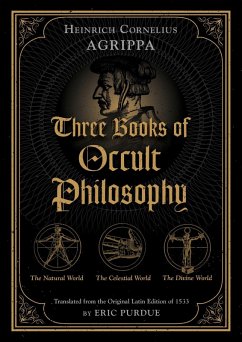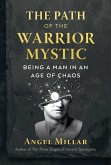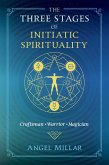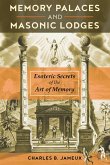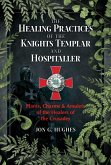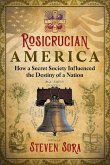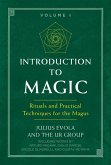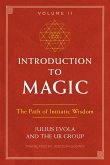Three Books of Occult Philosophy (eBook, ePUB)


Alle Infos zum eBook verschenken

Three Books of Occult Philosophy (eBook, ePUB)
- Format: ePub
- Merkliste
- Auf die Merkliste
- Bewerten Bewerten
- Teilen
- Produkt teilen
- Produkterinnerung
- Produkterinnerung

Hier können Sie sich einloggen

Bitte loggen Sie sich zunächst in Ihr Kundenkonto ein oder registrieren Sie sich bei bücher.de, um das eBook-Abo tolino select nutzen zu können.
• Three hardcover volumes in slipcase • Corrects the many mistranslations, copyist mistakes, and errors introduced from other editions, drawing on new research and access to Agrippa's source texts • Restores all of Agrippa's original illustrations • Presents a nearly complete bibliography of Agrippa's primary sources One of the most important texts in the Western magical tradition for nearly 500 years, Heinrich Cornelius Agrippa's 1533 work Three Books of Occult Philosophy collates a multitude of sources from the Classical, Medieval, and Renaissance periods and organizes them into a coherent…mehr
- Geräte: eReader
- mit Kopierschutz
- eBook Hilfe
- Größe: 11.13MB
- FamilySharing(5)
![The Path of the Warrior-Mystic (eBook, ePUB) The Path of the Warrior-Mystic (eBook, ePUB)]() Angel MillarThe Path of the Warrior-Mystic (eBook, ePUB)12,85 €
Angel MillarThe Path of the Warrior-Mystic (eBook, ePUB)12,85 €![The Three Stages of Initiatic Spirituality (eBook, ePUB) The Three Stages of Initiatic Spirituality (eBook, ePUB)]() Angel MillarThe Three Stages of Initiatic Spirituality (eBook, ePUB)12,85 €
Angel MillarThe Three Stages of Initiatic Spirituality (eBook, ePUB)12,85 €![Memory Palaces and Masonic Lodges (eBook, ePUB) Memory Palaces and Masonic Lodges (eBook, ePUB)]() Charles B. JameuxMemory Palaces and Masonic Lodges (eBook, ePUB)9,88 €
Charles B. JameuxMemory Palaces and Masonic Lodges (eBook, ePUB)9,88 €![The Healing Practices of the Knights Templar and Hospitaller (eBook, ePUB) The Healing Practices of the Knights Templar and Hospitaller (eBook, ePUB)]() Jon G. HughesThe Healing Practices of the Knights Templar and Hospitaller (eBook, ePUB)16,80 €
Jon G. HughesThe Healing Practices of the Knights Templar and Hospitaller (eBook, ePUB)16,80 €![Rosicrucian America (eBook, ePUB) Rosicrucian America (eBook, ePUB)]() Steven SoraRosicrucian America (eBook, ePUB)12,85 €
Steven SoraRosicrucian America (eBook, ePUB)12,85 €![Introduction to Magic (eBook, ePUB) Introduction to Magic (eBook, ePUB)]() Julius EvolaIntroduction to Magic (eBook, ePUB)16,80 €
Julius EvolaIntroduction to Magic (eBook, ePUB)16,80 €![Introduction to Magic, Volume II (eBook, ePUB) Introduction to Magic, Volume II (eBook, ePUB)]() Julius EvolaIntroduction to Magic, Volume II (eBook, ePUB)17,79 €
Julius EvolaIntroduction to Magic, Volume II (eBook, ePUB)17,79 €-
-
-
Dieser Download kann aus rechtlichen Gründen nur mit Rechnungsadresse in A, B, BG, CY, CZ, D, DK, EW, E, FIN, F, GR, HR, H, I, LT, L, LR, M, NL, PL, P, R, S, SLO, SK ausgeliefert werden.
Hinweis: Dieser Artikel kann nur an eine deutsche Lieferadresse ausgeliefert werden.
- Produktdetails
- Verlag: Simon + Schuster LLC
- Seitenzahl: 864
- Erscheinungstermin: 23. November 2021
- Englisch
- ISBN-13: 9781644114179
- Artikelnr.: 61224743
- Verlag: Simon + Schuster LLC
- Seitenzahl: 864
- Erscheinungstermin: 23. November 2021
- Englisch
- ISBN-13: 9781644114179
- Artikelnr.: 61224743
- Herstellerkennzeichnung Die Herstellerinformationen sind derzeit nicht verfügbar.
Foreword by Christopher Warnock
Acknowledgments
Translator’s Introduction
Three Books of Occult Philosophy
To the Reader
Letter from Agrippa to Trithemius
Letter of Response from Trithemius to Agrippa
Dedicatory letter to Count Hermann of Weid
Book One
The Natural World
1 How magicians collect virtues of the threefold world will be shown in
these three books.
2 What magic is, what are its parts, and what is required of a professor of
magic.
3 Of the four elements, their qualities, and their mixtures with each
other.
4 Of the rationale of the threefold consideration of the elements.
5 Of the wonderful natures of fire and earth.
6 The wonderful natures of water, air, and wind.
7 Of the types of compounds, how they are according to the elements, and
how the elements agree with each other, with the soul, the senses, and
behavior.
8 How the elements are in the heavens, the stars, in daemons, in angels,
and finally in God Himself.
9 Of the virtues of natural things most closely depending upon the
elements.
10 Of the occult virtues of things.
11 How occult virtues are infused into kinds of things by ideas through the
World Soul, the stellar rays, and which things are most abundant with this
virtue.
12 How different virtues are infused into different individuals and
species.
13 From where occult virtues of things proceed.
14 Of what the World Spirit is and how it binds occult virtues.
15 How we must investigate and test the virtues of things by way of
acceptance and similarity.
16 How the operations of different virtues are transferred from one thing
to another, and how they are shared with each other.
17 How the virtues of things are investigated and tested by hatred and
friendship.
18 Of the inclinations of enmities.
19 How the virtues of things are investigated and tested, which things
belong to the entire species, or what things are developed by being granted
to particular individuals.
20 How natural virtues in some [things] are throughout their entire
substance, but in other [things] in certain parts or members.
21 Of the virtues of things that belong to themselves only in their
lifetime, and those [virtues] that remain in them even after death.
22 How inferior things are under celestial bodies, and how the human body,
activities, and customs of man are assigned to the stars and signs.
23 How we shall know under which star natural things are and which things
are Solar.
24 Of things that are under the Moon.
25 What is under Saturn.
26 That which is of Jupiter.
27 That which refers to Mars.
28 That which is of Venus.
29 Of what follows Mercury.
30 How the entire sublunary world, and that which is in it, is distributed
among the planets.
31 How the planets are distributed among the provinces and kingdoms.
32 Of what is under the signs, the fixed stars, and their images.
33 Of the seals and characters of natural things.
34 How through natural things and their virtues, we can draw and attract
influences and virtues of celestial bodies.
35 Of the mixtures of natural things with each other and their usefulness.
36 Of the union of mixed things and the introduction of more noble forms
and the senses of life.
37 How with certain reliable natural and artificial preparations we may
attract certain celestial and vital gifts from above.
38 How gifts are not only celestial and vital but are also received from
certain intellectual and divine gifts from above.
39 That with certain reliable materials of the world we can draw the divine
world and their divine ministering daemons.
40 Of what bindings are and how they are made.
41 Of sorceries and their power.
42 Of the wonderful virtues of certain sorceries.
43 Of fumigations, their reasoning, and power.
44 The composition of certain fumigations appropriate to the planets.
45 Of the virtues of collyries, ointments, and love potions.
46 Of natural alligations and suspensions.
47 Of rings and their composition.
48 Of the virtues of places, and the places corresponding to each of the
stars.
49 Of lights and colors, lanterns, and lamps, and the colors distributed
among the stars, houses, and elements.
50 Of bewitchings and their art.
51 Of certain observations producing wonderful virtues.
52 Of the face, gestures, habits, and figure of the body, to which stars
these respond, and from where the arts of physiognomy, metoposcopy, and
chiromancy have their foundations.
53 Of divination, auspices, and auguries.
54 Of some different animals and other things that have significations in
auguries.
55 How auspices are verified through the light of the natural senses, and
some rules for proving them.
56 Of soothsaying of lightning and flashes, and how to interpret portents
and prodigies.
57 Of geomancy, hydromancy, aeromancy, and pyromancy; divinations of the
four elements.
58 Of reviving the dead, sleeping, and fasting for a long time.
59 Of divination through dreams.
60 Of frenzy and divinations that happen when awake, of the power of the
melancholy humor, which sometimes also allures daemons in the human body.
61 Of the forming of man, of the outer and inner senses, of the mind, of
the threefold appetite of the soul, and the passion of will.
62 Of the passions of the mind, their origin, difference, and kinds.
63 How passions of the mind change one’s own body by exchanging accidents
and moving the spirit.
64 How the passions of the mind change the body by the imitation of a
likeness; also of the transformation and transference of man, and the
strength of imaginative power held not only in the body but also in the
soul.
65 How the passions of the mind also operate outside of themselves in
another’s body.
66 That the passions of the mind are most helped by the proper timing of
the celestials, and how the perseverance of mind is necessary in all works.
67 How the human mind can connect with the celestial mind andintelligences,
and likewise with them impress certain wonderful virtues on inferior
things.
68 How our mind can change and bind inferior things to that which is
desired.
69 Of speech and the virtues of words.
70 Of the virtue of particular names.
71 Of complex speeches and songs, and the virtues and bindings of
incantations.
72 Of the wonderful power of incantations.
73 Of the virtue of writings, and of making imprecations and inscriptions.
74 Of the proportion, correspondence, and reduction of letters to the
celestial signs and planets according to various languages, with a table
indicating this.
Book Two
The Celestial World
Dedicatory Letter to Count Hermann of Weid
1 Of the necessity of the discipline of mathematics and its many wonderful
operations, which only the arts of mathematics can perform.
2 Of numbers, their power, and virtue.
3 That numbers possess such great virtues in natural things as well as
transnatural things.
4 Of one and its scale.
5 Of two and its scale.
6 Of three and its scale.
7 Of four and its scale.
8 Of five and its scale.
9 Of six and its scale.
10 Of seven and its scale.
11 Of eight and its scale.
12 Of nine and its scale.
13 Of ten and its scale.
14 Of eleven and twelve, with a twofold scale of twelve, and the
kabbalistic and Orphic.
15 Of numbers above twelve, their powers and virtues.
16 Of notable numbers placed in certain gestures.
17 Of various marks of numbers observed by the Romans.
18 Of the marks of the Greeks.
19 Of the marks of the Hebrews and Chaldeans, and certain other marks of
magicians.
20 Which numbers are assigned to letters and of the divination of the same.
21 Which numbers are sacred to which gods and which are appointed to the
elements.
22 Of the tables of the planets and their virtues and principles, and which
divine names, intelligences, and daemons are placed in charge of them.
23 Of geometric figures and bodies, of what magical virtue they exert their
influence, and which [figures] agree to each element and the heavens.
24 Of musical harmony, and its strength and power.
25 Of sound and harmonies, and from where their wonderfulness in operation
comes.
26 Of the agreement of [sounds and harmonies] with the celestials, and how
each harmony of sound responds to each star.
27 Of the proportion, measure, and harmony of the human body.
28 Of the composition and harmony of the human soul.
29 That the observation of the celestials is necessary in all magical
operations.
30 When the planets are the most powerfully influential.
31 Of the observation of the fixed stars and their natures.
32 The Sun and Moon and their magical reasoning.
33 Of the twenty-eight mansions of the Moon and their virtues.
34 Of the true motion of the celestials to be observed in the eighth
sphere, and the rationale of the planetary hours.
35 How artificial things, such as images, sigils, and the like, obtain some
virtues from celestial bodies.
36 Of the images of the zodiac that accept virtues from the stars when
engraved.
37 Of the images of the faces and their virtues, and of those images that
are outside the zodiac.
38 Of the images of Saturn.
39 Of the images of Jupiter.
40 Of the images of Mars.
41 Of the images of the Sun.
42 Of the images of Venus.
43 Of the images of Mercury.
44 Of the images of the Moon.
45 Of the images of the Head and Tail of the Dragon of the Moon.
46 Of the images of the mansions of the Moon.
47 Of the images of the fixed Behenian stars.
48 Of the figures of geomancy, which are the medium between images and
characters, and its table.
49 Of images whose figure is not like some celestial figure, but of that
which the mind of the operator desires.
50 Of certain celestial observations and the practice of some of their
images.
51 Of characters that are made after the pattern and imitation of the
celestials, and how they are deduced from geomantic figures with a table of
them.
52 Of characters that are derived from things themselves with a certain
similarity.
53 How no divination without astrology is perfect.
54 Of lots and from when and where the virtues of their divinations are
produced.
55 Of the World Soul and celestials according to the traditions of poets
and philosophers.
56 The same is confirmed by reason.
57 That the World Soul and celestial souls are rational and share in the
Divine Mind.
58 Of the names of the celestial souls and their lordship in this inferior
world--namely man.
59 Of the seven governors of the world, the planets, and their various
magical names devoted to speeches.
60 That human imprecations naturally imprint their powers in outer things,
and how the human mind through each degree of dependencies ascends in the
intelligible world and becomes like the more sublime spirits and
intelligences.
Book Three
The Divine World
Dedicatory Letter to Count Hermann of Weid
1 Of the necessity, virtue, and usefulness of religion.
2 Of silence and concealing that which is secret in religion.
3 What dignification is required so that one can become a true magician and
worker of wonders.
4 Of the two supports of ceremonial magic: religion and superstition.
5 Of the three guides of religion, which lead us to the path of truth.
6 How, with these guides, the human soul rises into the divine nature and
is made a producer of miracles.
7 That knowledge of the true God is necessary for the magician, and what
the ancient magicians and philosophers thought about God.
8 What the ancient philosophers thought about the divine Trinity.
9 What the true and most orthodox faith is about God and the most holy
Trinity.
10 Of the divine emanations, which Hebrews call numerations, others call
attributes, and gentiles call gods and deities, and of the ten Sephiroth
and ten most sacred names of God presiding over them and the interpretation
of them.
11 Of divine names, their power, and virtue.
12 Of the influence of divine names through each medium in these inferiors.
13 Of the members of God and of their influence in our members.
14 Of the gods of the gentiles, the souls of the celestial bodies, and
which deities were once made sacred to [particular] places.
15 What our theologians think about the celestial souls.
16 Of intelligences and daemons, their threefold kinds, their various
names, and of infernal and subterranean daemons.
17 Of the same according to the opinions of theologians.
18 Of the orders of evil daemons, and their fallen and various natures.
19 Of the bodies of daemons.
20 Of the infestation of evil daemons, and the protection we have from good
daemons.
21 Of obeying one’s own genius, and the investigation of its nature.
22 Of the threefold guardian of man and from where each comes.
23 Of the tongue of angels, and their conversations with each other and
with us.
24 Of the names of spirits, their various applications, and of the spirits
that rule the stars, signs, the directions of heaven, and the elements.
25 How Hebrew mekubalim elicit the sacred names of angels from holy
scriptures, and of the seventy-two angels who hold the name of God with
tables of Ziruph, and the exchange of letters and numbers.
26 Of finding the names of spirits and geniuses from the disposition of the
celestial bodies.
27 Of the art of calculating these kinds of names from the tradition of
kabbalists.
28 How spirits sometimes take their names from things that they are placed
in command over.
29 Of the characters and seals of spirits.
30 Another method of characters from the kabbalistic tradition.
31 Yet another method of characters and seals of spirits, which are only
received by revelation.
32 How we can draw good daemons to us, and how we can conquer evil daemons.
33 Of the chains of spirits, and of their adjurations and expulsions.
34 Of the animistical order and heroes.
35 Of mortal and earthly gods.
36 Of how man was created in the image of God.
37 Of the human soul, and by which medium it is joined to the body.
38 What divine gifts man receives from above from each of the orders of the
celestials and intelligences.
39 How superior influences, since they have a good nature, are distorted in
these inferiors and are made causes of evil.
40 That each man is impressed with a divine character from whose power he
can attain wonderful works.
41 What various opinions are concerning man after death.
42 By what methods magicians and necromancers think they can summon the
souls of the dead.
43 Of the power of the human soul in the mind, reason, and idolum.
44 Of the degrees of souls and their perishing or immortality.
45 Of prophecy and frenzy.
46 Of the first kind of frenzy: from the Muses.
47 Of the second kind of frenzy: from Dionysus.
48 Of the third kind of frenzy: from Apollo.
49 Of the fourth kind of frenzy: from Venus.
50 Of rapture, ecstasy, and predictions that happen to those taken with
epilepsy, fainting, and those in a struggle [with death].
51 Of prophetic dreams.
52 Of lots and marks holding the certain power of oracles.
53 How one should dispose themselves if they wish to receive oracles.
54 Of cleanliness and how it must be observed.
55 Of abstinence, fasting, chastity, solitude, tranquillity, and ascension
of the mind.
56 Of penance and alms.
57 Of those things that are administered externally that bring expiation.
58 Of adorations and vows.
59 Of sacrifices and offerings, and their types and manners.
60 What imprecations and rites the ancients often used in sacrifices and
offerings.
61 How these things must be performed to God and to inferior deities.
62 Of consecrations and their method.
63 What can be called sacred, what can be called consecrated, and how these
can be between us and the gods, and of sacred times.
64 Of certain religious observations, ceremonies, and rites of fumigations,
anointings, and the like.
65 The conclusion of the whole work.
Bibliography
Index
Foreword by Christopher Warnock
Acknowledgments
Translator’s Introduction
Three Books of Occult Philosophy
To the Reader
Letter from Agrippa to Trithemius
Letter of Response from Trithemius to Agrippa
Dedicatory letter to Count Hermann of Weid
Book One
The Natural World
1 How magicians collect virtues of the threefold world will be shown in
these three books.
2 What magic is, what are its parts, and what is required of a professor of
magic.
3 Of the four elements, their qualities, and their mixtures with each
other.
4 Of the rationale of the threefold consideration of the elements.
5 Of the wonderful natures of fire and earth.
6 The wonderful natures of water, air, and wind.
7 Of the types of compounds, how they are according to the elements, and
how the elements agree with each other, with the soul, the senses, and
behavior.
8 How the elements are in the heavens, the stars, in daemons, in angels,
and finally in God Himself.
9 Of the virtues of natural things most closely depending upon the
elements.
10 Of the occult virtues of things.
11 How occult virtues are infused into kinds of things by ideas through the
World Soul, the stellar rays, and which things are most abundant with this
virtue.
12 How different virtues are infused into different individuals and
species.
13 From where occult virtues of things proceed.
14 Of what the World Spirit is and how it binds occult virtues.
15 How we must investigate and test the virtues of things by way of
acceptance and similarity.
16 How the operations of different virtues are transferred from one thing
to another, and how they are shared with each other.
17 How the virtues of things are investigated and tested by hatred and
friendship.
18 Of the inclinations of enmities.
19 How the virtues of things are investigated and tested, which things
belong to the entire species, or what things are developed by being granted
to particular individuals.
20 How natural virtues in some [things] are throughout their entire
substance, but in other [things] in certain parts or members.
21 Of the virtues of things that belong to themselves only in their
lifetime, and those [virtues] that remain in them even after death.
22 How inferior things are under celestial bodies, and how the human body,
activities, and customs of man are assigned to the stars and signs.
23 How we shall know under which star natural things are and which things
are Solar.
24 Of things that are under the Moon.
25 What is under Saturn.
26 That which is of Jupiter.
27 That which refers to Mars.
28 That which is of Venus.
29 Of what follows Mercury.
30 How the entire sublunary world, and that which is in it, is distributed
among the planets.
31 How the planets are distributed among the provinces and kingdoms.
32 Of what is under the signs, the fixed stars, and their images.
33 Of the seals and characters of natural things.
34 How through natural things and their virtues, we can draw and attract
influences and virtues of celestial bodies.
35 Of the mixtures of natural things with each other and their usefulness.
36 Of the union of mixed things and the introduction of more noble forms
and the senses of life.
37 How with certain reliable natural and artificial preparations we may
attract certain celestial and vital gifts from above.
38 How gifts are not only celestial and vital but are also received from
certain intellectual and divine gifts from above.
39 That with certain reliable materials of the world we can draw the divine
world and their divine ministering daemons.
40 Of what bindings are and how they are made.
41 Of sorceries and their power.
42 Of the wonderful virtues of certain sorceries.
43 Of fumigations, their reasoning, and power.
44 The composition of certain fumigations appropriate to the planets.
45 Of the virtues of collyries, ointments, and love potions.
46 Of natural alligations and suspensions.
47 Of rings and their composition.
48 Of the virtues of places, and the places corresponding to each of the
stars.
49 Of lights and colors, lanterns, and lamps, and the colors distributed
among the stars, houses, and elements.
50 Of bewitchings and their art.
51 Of certain observations producing wonderful virtues.
52 Of the face, gestures, habits, and figure of the body, to which stars
these respond, and from where the arts of physiognomy, metoposcopy, and
chiromancy have their foundations.
53 Of divination, auspices, and auguries.
54 Of some different animals and other things that have significations in
auguries.
55 How auspices are verified through the light of the natural senses, and
some rules for proving them.
56 Of soothsaying of lightning and flashes, and how to interpret portents
and prodigies.
57 Of geomancy, hydromancy, aeromancy, and pyromancy; divinations of the
four elements.
58 Of reviving the dead, sleeping, and fasting for a long time.
59 Of divination through dreams.
60 Of frenzy and divinations that happen when awake, of the power of the
melancholy humor, which sometimes also allures daemons in the human body.
61 Of the forming of man, of the outer and inner senses, of the mind, of
the threefold appetite of the soul, and the passion of will.
62 Of the passions of the mind, their origin, difference, and kinds.
63 How passions of the mind change one’s own body by exchanging accidents
and moving the spirit.
64 How the passions of the mind change the body by the imitation of a
likeness; also of the transformation and transference of man, and the
strength of imaginative power held not only in the body but also in the
soul.
65 How the passions of the mind also operate outside of themselves in
another’s body.
66 That the passions of the mind are most helped by the proper timing of
the celestials, and how the perseverance of mind is necessary in all works.
67 How the human mind can connect with the celestial mind andintelligences,
and likewise with them impress certain wonderful virtues on inferior
things.
68 How our mind can change and bind inferior things to that which is
desired.
69 Of speech and the virtues of words.
70 Of the virtue of particular names.
71 Of complex speeches and songs, and the virtues and bindings of
incantations.
72 Of the wonderful power of incantations.
73 Of the virtue of writings, and of making imprecations and inscriptions.
74 Of the proportion, correspondence, and reduction of letters to the
celestial signs and planets according to various languages, with a table
indicating this.
Book Two
The Celestial World
Dedicatory Letter to Count Hermann of Weid
1 Of the necessity of the discipline of mathematics and its many wonderful
operations, which only the arts of mathematics can perform.
2 Of numbers, their power, and virtue.
3 That numbers possess such great virtues in natural things as well as
transnatural things.
4 Of one and its scale.
5 Of two and its scale.
6 Of three and its scale.
7 Of four and its scale.
8 Of five and its scale.
9 Of six and its scale.
10 Of seven and its scale.
11 Of eight and its scale.
12 Of nine and its scale.
13 Of ten and its scale.
14 Of eleven and twelve, with a twofold scale of twelve, and the
kabbalistic and Orphic.
15 Of numbers above twelve, their powers and virtues.
16 Of notable numbers placed in certain gestures.
17 Of various marks of numbers observed by the Romans.
18 Of the marks of the Greeks.
19 Of the marks of the Hebrews and Chaldeans, and certain other marks of
magicians.
20 Which numbers are assigned to letters and of the divination of the same.
21 Which numbers are sacred to which gods and which are appointed to the
elements.
22 Of the tables of the planets and their virtues and principles, and which
divine names, intelligences, and daemons are placed in charge of them.
23 Of geometric figures and bodies, of what magical virtue they exert their
influence, and which [figures] agree to each element and the heavens.
24 Of musical harmony, and its strength and power.
25 Of sound and harmonies, and from where their wonderfulness in operation
comes.
26 Of the agreement of [sounds and harmonies] with the celestials, and how
each harmony of sound responds to each star.
27 Of the proportion, measure, and harmony of the human body.
28 Of the composition and harmony of the human soul.
29 That the observation of the celestials is necessary in all magical
operations.
30 When the planets are the most powerfully influential.
31 Of the observation of the fixed stars and their natures.
32 The Sun and Moon and their magical reasoning.
33 Of the twenty-eight mansions of the Moon and their virtues.
34 Of the true motion of the celestials to be observed in the eighth
sphere, and the rationale of the planetary hours.
35 How artificial things, such as images, sigils, and the like, obtain some
virtues from celestial bodies.
36 Of the images of the zodiac that accept virtues from the stars when
engraved.
37 Of the images of the faces and their virtues, and of those images that
are outside the zodiac.
38 Of the images of Saturn.
39 Of the images of Jupiter.
40 Of the images of Mars.
41 Of the images of the Sun.
42 Of the images of Venus.
43 Of the images of Mercury.
44 Of the images of the Moon.
45 Of the images of the Head and Tail of the Dragon of the Moon.
46 Of the images of the mansions of the Moon.
47 Of the images of the fixed Behenian stars.
48 Of the figures of geomancy, which are the medium between images and
characters, and its table.
49 Of images whose figure is not like some celestial figure, but of that
which the mind of the operator desires.
50 Of certain celestial observations and the practice of some of their
images.
51 Of characters that are made after the pattern and imitation of the
celestials, and how they are deduced from geomantic figures with a table of
them.
52 Of characters that are derived from things themselves with a certain
similarity.
53 How no divination without astrology is perfect.
54 Of lots and from when and where the virtues of their divinations are
produced.
55 Of the World Soul and celestials according to the traditions of poets
and philosophers.
56 The same is confirmed by reason.
57 That the World Soul and celestial souls are rational and share in the
Divine Mind.
58 Of the names of the celestial souls and their lordship in this inferior
world--namely man.
59 Of the seven governors of the world, the planets, and their various
magical names devoted to speeches.
60 That human imprecations naturally imprint their powers in outer things,
and how the human mind through each degree of dependencies ascends in the
intelligible world and becomes like the more sublime spirits and
intelligences.
Book Three
The Divine World
Dedicatory Letter to Count Hermann of Weid
1 Of the necessity, virtue, and usefulness of religion.
2 Of silence and concealing that which is secret in religion.
3 What dignification is required so that one can become a true magician and
worker of wonders.
4 Of the two supports of ceremonial magic: religion and superstition.
5 Of the three guides of religion, which lead us to the path of truth.
6 How, with these guides, the human soul rises into the divine nature and
is made a producer of miracles.
7 That knowledge of the true God is necessary for the magician, and what
the ancient magicians and philosophers thought about God.
8 What the ancient philosophers thought about the divine Trinity.
9 What the true and most orthodox faith is about God and the most holy
Trinity.
10 Of the divine emanations, which Hebrews call numerations, others call
attributes, and gentiles call gods and deities, and of the ten Sephiroth
and ten most sacred names of God presiding over them and the interpretation
of them.
11 Of divine names, their power, and virtue.
12 Of the influence of divine names through each medium in these inferiors.
13 Of the members of God and of their influence in our members.
14 Of the gods of the gentiles, the souls of the celestial bodies, and
which deities were once made sacred to [particular] places.
15 What our theologians think about the celestial souls.
16 Of intelligences and daemons, their threefold kinds, their various
names, and of infernal and subterranean daemons.
17 Of the same according to the opinions of theologians.
18 Of the orders of evil daemons, and their fallen and various natures.
19 Of the bodies of daemons.
20 Of the infestation of evil daemons, and the protection we have from good
daemons.
21 Of obeying one’s own genius, and the investigation of its nature.
22 Of the threefold guardian of man and from where each comes.
23 Of the tongue of angels, and their conversations with each other and
with us.
24 Of the names of spirits, their various applications, and of the spirits
that rule the stars, signs, the directions of heaven, and the elements.
25 How Hebrew mekubalim elicit the sacred names of angels from holy
scriptures, and of the seventy-two angels who hold the name of God with
tables of Ziruph, and the exchange of letters and numbers.
26 Of finding the names of spirits and geniuses from the disposition of the
celestial bodies.
27 Of the art of calculating these kinds of names from the tradition of
kabbalists.
28 How spirits sometimes take their names from things that they are placed
in command over.
29 Of the characters and seals of spirits.
30 Another method of characters from the kabbalistic tradition.
31 Yet another method of characters and seals of spirits, which are only
received by revelation.
32 How we can draw good daemons to us, and how we can conquer evil daemons.
33 Of the chains of spirits, and of their adjurations and expulsions.
34 Of the animistical order and heroes.
35 Of mortal and earthly gods.
36 Of how man was created in the image of God.
37 Of the human soul, and by which medium it is joined to the body.
38 What divine gifts man receives from above from each of the orders of the
celestials and intelligences.
39 How superior influences, since they have a good nature, are distorted in
these inferiors and are made causes of evil.
40 That each man is impressed with a divine character from whose power he
can attain wonderful works.
41 What various opinions are concerning man after death.
42 By what methods magicians and necromancers think they can summon the
souls of the dead.
43 Of the power of the human soul in the mind, reason, and idolum.
44 Of the degrees of souls and their perishing or immortality.
45 Of prophecy and frenzy.
46 Of the first kind of frenzy: from the Muses.
47 Of the second kind of frenzy: from Dionysus.
48 Of the third kind of frenzy: from Apollo.
49 Of the fourth kind of frenzy: from Venus.
50 Of rapture, ecstasy, and predictions that happen to those taken with
epilepsy, fainting, and those in a struggle [with death].
51 Of prophetic dreams.
52 Of lots and marks holding the certain power of oracles.
53 How one should dispose themselves if they wish to receive oracles.
54 Of cleanliness and how it must be observed.
55 Of abstinence, fasting, chastity, solitude, tranquillity, and ascension
of the mind.
56 Of penance and alms.
57 Of those things that are administered externally that bring expiation.
58 Of adorations and vows.
59 Of sacrifices and offerings, and their types and manners.
60 What imprecations and rites the ancients often used in sacrifices and
offerings.
61 How these things must be performed to God and to inferior deities.
62 Of consecrations and their method.
63 What can be called sacred, what can be called consecrated, and how these
can be between us and the gods, and of sacred times.
64 Of certain religious observations, ceremonies, and rites of fumigations,
anointings, and the like.
65 The conclusion of the whole work.
Bibliography
Index
